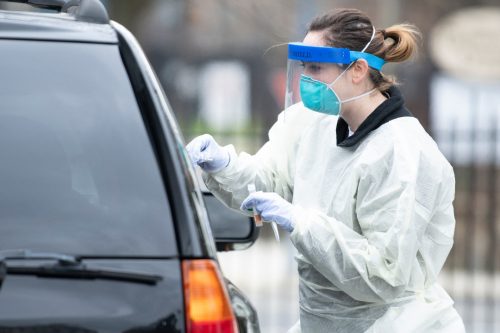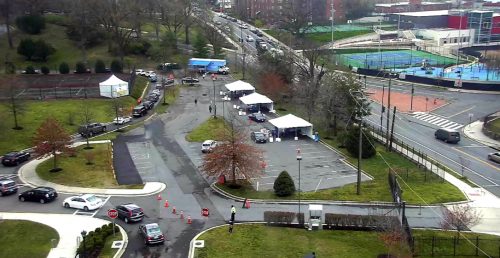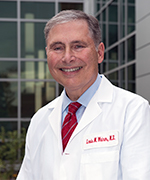
Medical professionals at Children’s National operating drive-through and walk-up testing sites.
Children’s National and Georgetown Lombardi Comprehensive Cancer Institute have both had to cancel critical fundraising events, leaving a philanthropic hole in their annual budgets.
For many non-profit organizations across the region, the questions during the COVID-19 crisis are endless: ‘How do we balance providing crucial services while protecting our frontline workers? How do we continue vital research with the unpredictable nature of corporate giving amid revenue cuts? How do we make up the critical shortfall from being forced to cancel our fundraising events?’ The challenges are immense, the need is far-reaching and pessimism can be hard to quarantine. For those who want to make more of a difference (than purely following the stay-at-home orders) the time to act and give is now.
To learn more about the impact of COVID-19 on local health-related non-profits, we spoke to leaders at Children’s National Hospital and Georgetown Lombardi Comprehensive Cancer Institute.

DeAnn Marshall
President of Children’s National Hospital Foundation
Washington Life: How has the coronavirus impacted your organization?DeAnn Marshall: The COVID-19 pandemic is an unprecedented strain on our caregivers and our resources. While we currently have an adequate supply of personal protective equipment (PPE) and supplies, like many hospitals around the country, we are concerned about shortages. PPE is essential to the safety of our patients, their families and our care providers on the frontlines of this crisis. Innovators in our Sheikh Zayed Institute are developing techniques to produce masks and face shields in house to combat the PPE shortage our hospital faces. However, the greatest impact of COVID-19 is on our community. That’s why we acted quickly to open Washington, D.C.’s first pediatric drive-up specimen collection, which is helping families get their kids tested. It’s also why we developed in-hospital COVID-19 testing for inpatients and employees that can return results in 90 minutes. Children’s National will continue to provide care for our region’s youth throughout the crisis. More than 600 of our clinicians are now providing care through telehealth appointments, which helps limit the possible exposure of our patients and caregivers to COVID-19. Additionally, our experts developed resources to help parents talk about the disease with their children, including those with autism. We also cancelled or postponed several important events this spring, such as our Children’s Ball, out of concern for the safety of our community. These events raise millions of dollars each year to support research and clinical care.
Are there ways that our readers can help? Our community’s support is critical to our response to the pandemic. We created the COVID-19 Emergency Action Fund to respond quickly to the most urgent needs– so we can continue to be a lifeline for our caregivers and our patients. Donations to this fund provide important resources ranging from PPE and cleaning supplies to child care for our employees and the operation of our testing site. The importance of testing children for COVID-19 will continue to grow as we move deeper into this pandemic. While children have shown less severe symptoms to date, they can still act as carriers of the virus and put others at risk. Understanding how widespread COVID-19 is among children helps us gauge the long-term needs of programs like remote learning. It will help our community leaders make smart, safe decisions about returning kids to school, which has far-ranging implications for our daily lives. Your readers can support our efforts by visiting ChildrensNational.org/coronavirus.

An aerial view of the Children’s testing site
FUNDING SHORTFALL SLOWS RESEARCH: WHAT CAN BE DONE NOW?
‘Some of our finest research programs were spurred with a small amount of philanthropic money…what that really means is that we are going to face a shortfall of available resources to support these exciting new concepts.’ — Dr. Louis Weiner
DR. LOUIS WEINER
Director, Georgetown Lombardi Comprehensive Cancer Institute
Washington Life: How has the coronavirus impacted your organization?
Dr. Louis Weiner: Like all cancer centers, this pandemic has had a profound impact, in multiple ways. Cancer patients are legitimately concerned, and vulnerable to the virus and to
infection. At times when our patients need the proximity and comfort of their loved ones, they may find themselves isolated. And cancer patients worry that if resources are scarce, their care will not be prioritized.
What changes have you made to help navigate the emergency?
We have instituted a variety of care strategies and patient outreach activities, including online videos, to help navigate through the particular challenges of facing this pandemic as a cancer patient. Research cures cancer. In the face of this pandemic we have had to significantly scale back all on-campus research activities, which is a challenge to this progress.
How have you scaled back?
We’ve halted all major fundraising events for at least three months. Lombardi relies upon philanthropy to support early-stage pilot investigations that can form the basis for future, federally funded research projects. The competition for such funding is fierce. Across the nation, only about 10 percent of research proposals submitted to the National Cancer Institute for federal support are funded in any given cycle. Philanthropy is the critical component of getting the resources that we need to conduct research on the next great ‘what if.’ Some of our finest research programs were spurred with a small amount of philanthropic money.
And what that really means is that we are going to face a shortfall of available resources to support these exciting new concepts and push us four to six months further away from cancer cures. So, this is a wonderful opportunity for philanthropically inclined Washingtonians to think about supporting our research mission. What was the revenue target from your main fundraiser, and what plans do you have to recoup? Our fundraising events raise about $3 million yearly, and about half of that comes from our signature event—the Lombardi Gala, held in November. However, much of the work on the Gala occurs in the spring and summer, so we will be hamstrung by the social isolation, understandable distraction and financial concerns of volunteers and donors as they grapple with the pandemic. Our other signature events, Lombardi Women and the Men’s Event, are facing challenges related to postponement and a reassessment of the best and safest format moving forward.
Are there ways that our readers can help?
You bet! Donations may be made online, by phone or through mail. You may visit our website lombardi.georgetown.edu/giving. Please consider contributing what you
can. Our work will continue, and we need your help! You can also get involved. We want your readers to know that they can volunteer to serve on our various event committees—contact us for more information.
What are some of your successes over the past year?
Over the years, we have conducted research leading to breakthroughs in vaccination against the human papillomavirus (the major cause of cancers of the cervix). Lombardi has pioneered work that has led to a better understanding of the role of estrogens in breast cancer, and in the development of lifesaving cancer immunotherapies.
Here are a few recent examples:
1. Life-saving immunotherapies—Treatments developed at Lombardi that teach the body’s immune system to attack its own cancer have revolutionized the treatment of deadly melanoma, lung cancer and liver
cancer.
2. Lombardi scientists are pioneering new ways to understand and overcome cognitive declines (“chemobrain”) caused by chemotherapy.
How long will it take to restore normality, and what (if anything) do you think will be different in that normality?
We may need to redefine normality, as the challenges imposed by this pandemic are sure to have lasting impacts. However, we intend for our crucially important work to be fully operational within a few months, especially with the support of your readers.




